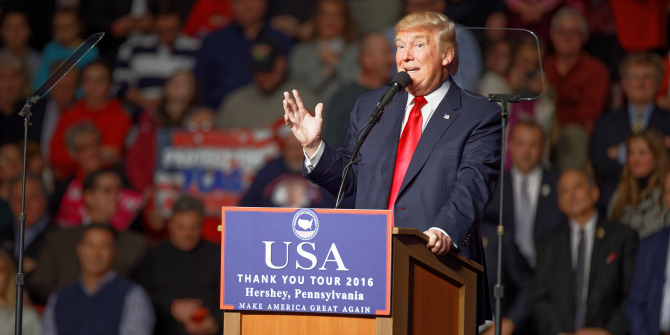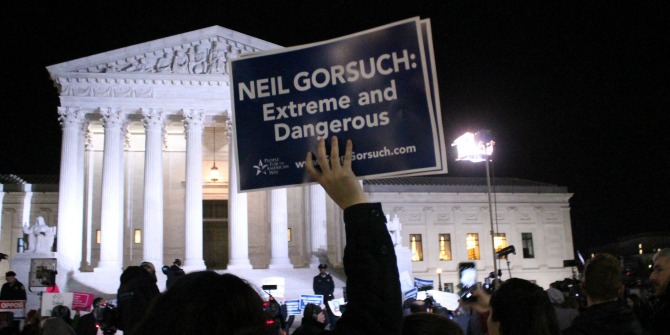USAPP Managing Editor, Chris Gilson looks at the best of the week’s political blogging from academics and think-tanks. Don’t see a blog referenced here that you think we should be reading? Let us know what we’ve missed out and we’ll try to include it next week.
Jump to
[one_half last=”no”]
President Trump and the Republican Party
The Democratic Party
The House and Senate
Elections and American democracy
[/one_half][one_half last=”yes”]
The Government, Beltway and the Supreme Court
Foreign policy, defense and trade
Obamacare and health policy
The economy and society
[/one_half]
President Trump and the Republican Party
On Sunday, FiveThirtyEight writes that Donald Trump is doing the things that he said he would do during the campaign, including his executive order this week banning immigrants from seven Muslim-majority countries; the media should have taken him literally as well as seriously.
Balkinization comments that while Donald Trump is an “abnormal president”, his presidency is nonetheless the consequence of the normal constitutional politics of the 2016 election. Meanwhile, Outside the Beltway this week says that any commentary which has been suggesting that Trump may face impeachment in the near term is “delusional”. Why? Trump hasn’t done anything since he was inaugurates that has angered a large number of Republican voters. On Thursday, Beat the Press reports that Trump wants to overturn the current law that prevents churches from having tax-exempt status if they make political endorsements. If successful, Trump could then give money to church-like organisations which would funnel funds to his choice of candidates – while getting large tax write-offs.

Vox’s Mischiefs of Faction writes that Donald Trump’s team does not understand the presidency; they don’t get that it is not allowed to exert control over the media, and that the latter is supposed to check the power of the White House. On Monday, The Volokh Conspiracy writes that President Trump’s executive order which requires every proposal for regulation by an agency be matched by the repeal of two other regulations puts the rest of his regulatory agenda at risk. They say that at minimum, the odder will create confusion and slow down the implementation of agency agendas. Monkey Cage notes that most of Trump’s executive orders aren’t actually executive orders – they’re actually presidential memoranda, which tend to prompt action rather than direct it.
Even if impeachment isn’t on the table, the new Commander-in-Chief has reached negative job approval mere weeks after gaining the Oval Office reports Outside the Beltway. It took Bill Clinton 573 days to achieve the same poor approval ratings by comparison.
One of Trump’s most controversial actions this week was his executive order banning immigrants and refugees from seven Muslim majority countries. On Sunday Angry Bear recaps what has happened thus far, and is unclear as to whether the order has prompted a constitutional crisis after a US District Court judge granted a request to halt the order being carried out, which was then seemingly ignored by the Trump administration. The Volokh Conspiracy, meanwhile, says that while President Trump may have stated that he will hire “only the best people”, they were certainly not involved in the drafting and implementation of his executive order on immigration; the order looks like it has been drafted in such a way which means that it was likely not reviewed by competent counsel at all. On Friday, Outside the Beltway has the news that Trump advisor Kellyanne Conway has justified the executive order by citing the “Bowling Green massacre” – a terrorist attack that never actually happened.
For those who oppose Trump’s executive order on refugees, Balkinization recommends that they should not leave its repeal up to the Courts; non-citizens outside the US are not generally protected by the Constitution. On Monday night, President Trump fired the acting Attorney General, Sally Yates, who had refused to defend the administration’s refugee order. Outside the Beltway comments that Yates’ firing was not a “Monday night massacre” (referring to Richard Nixon’s “Saturday night massacre” of 1973) as Trump was well within his authority to fire her.
On Tuesday night, President Trump announced that he had picked Neil Gorsuch, a judge on the 10th US Circuit Court of Appeals to replace Justice Antonin Scalia on the US Supreme Court. FiveThirtyEight says that Gorsuch is a “Scalia clone” in that his opinions tend invoke originalism.
Turning to the Republican Party more specifically, Epic Journey writes that GOP states not only continue to outnumber Democratic ones, but that the House is in the middle of a sustained period where they control more seats than they have in 70 years.
With the nomination of Gorsuch by Trump, American Power wonders if it is time for “Never Trumpers” to get on board with the “#Trump train”. Lawyers, Guns & Money meanwhile argues that, in light of Trump’s refugee order, the Republican Party is what it said it is.
The Democratic Party
With the nomination of Neil Gorsuch to the Supreme Court, Senate Democrats face a choice, either obstruct his confirmation by the Senate in retaliation for the Republicans’ similar refusals to hold hearings on President Obama’s pick last year of Merrick Garland, or give him a relatively easy confirmation. Vox’s Mischiefs of Faction says that Democrats have little to loose by obstructing Gorsuch given that voters’ choices next year will be determined by other factors. Lawyers, Guns & Money meanwhile argues that the Senate Democrats should refuse to vote for Gorsuch or anyone else until the GOP holds hearings and votes on Garland. If the GOP calls their bluff and Garland is defeated, then Senate Democrats should demand that Trump nominates a qualified moderate Republican.
Writing from the other side of the aisle, American Power comments that a Democratic filibuster of Gorsuch could doom Senate Democrats in next year’s midterm elections.
On Thursday, Beat the Press argues that the policies of the Democratic Party – like free trade and protection from international competition for many professions – have actually hurt the working class.
The House and Senate
On Thursday, Monkey Cage hosts a debate over whether or not Congress should have to approve every federal regulation, referring to the Regulation from the Executive in Need of Scrutiny (REINS) Act, which was passed in the House in January.
This week Lawyers, Guns & Money argues that Speaker Paul Ryan (R-WI) is evil, rather than weak, commenting that he is a “full-on” supporter and collaborator with Donald Trump who can help him to pass large tax cuts for the rich.

Moving on to the Senate, Election Law blog wonders whether or not Senate Democrats will filibuster the confirmation of Judge Neil Gorsuch (mentioned above) for the Supreme Court, and if they should. He writes that there are three reasons why they might: that there is a huge split on what Democrats and Republicans feel are the key legal and political issues which matter to Americans, payback for the GOP’s obstruction of Merrick Garland last year, and to please the Democratic base. On Tuesday, Lawyers, Guns & Money lauds Senate Democrats for denying committee votes of Representative Tom Price (R-GA) and Steve Mnuchin to head the Departments of Health and the Treasury, respectively, by not showing up, thereby denying the GOP the quorum they needed. On Thursday, Vox’s Mischiefs of Faction says that 2017 is why the Senate filibuster exists: it allows Senators to publicly support their party’s position while privately cheering the obstruction of the minority party. American Power argues that that the Gorsuch nomination fight may well go nuclear with Majority Leader Mitch McConnell (KY) weighing the option of whether or not to throw out the filibuster for Supreme Court nominations.
Elections and American democracy
Thursday sees Sabato’s Crystal Ball comment that the despite the fact that 2016’s presidential results swing wildly in many congressional districts does not necessarily mean that the 2018 midterm elections will be difficult for incumbents.
State of Elections this week reports that Pennsylvania is leading the charge (with a state Senate bill) to reenact Section 4 of the Voting Rights Act, which was invalidated by the Supreme Court in 2013.
The debate over “fake news” has been raging in the wake of Donald Trump’s inauguration and continued through the first weeks of his presidency. The Disorder of Things looks at fake news and its relationship with social media.
Balkinization this week writes on what they say is an old theme: “life in a constitutional dictatorship”, by which they mean a president who issues many signing statements and insists on being “the decider”. Vox’s Mischiefs of Faction meanwhile tells us how we can distinguish between conservative policy actions and democracy-threatening actions from the president. One of the latter actions may well be President Trump’s continued insistence that he was denied the popular vote because of voter fraud. But who else believes in voter fraud? According to Monkey Cage, it’s Americans who are hostile to immigrants.
The Government, Beltway and the Supreme Court
On Monday, The Volokh Conspiracy reports that the Acting Attorney General, Sally Yates has ordered the Justice Department’s Attorneys to not defend President Trump’s executive order on immigration, because she does not believe it to be “wise or just”. By Monday evening, Trump had fired Yates and appointed Dana Boente – US Attorney for the Eastern District of Virginia – to replace her.
On Tuesday, Lawyers, Guns & Money says that, in reference to the immigration order, the Courts do not owe any undue deference to President Trump just because it pertains to national security.
The Volokh Conspiracy this week looks at a case currently before the US Court of Appeals for the 9th Circuit which will decide whether a county can ban all gun stores. They say that the Second Amendment prevents the prohibition of selling firearms in order to guard against the same issue that precipitated the American Revolution.

Ahead of Trump’s Gorsuch announcement, FiveThirtyEight considers just how conservative a Supreme Court nominee Donald Trump would be able to get through the Senate. They say a lot depends on how qualified – and how moderate – Trump’s nominee is. Monkey Cage also comments on the Supreme Court this week, writing that it will examine partisan gerrymandering this year. Unless the Court acts, they say, aggressive partisan gerrymandering is here to stay. On Thursday, FiveThirtyEight looks at how Trump’s Supreme Court could overturn Roe v. Wade without actually overturning it; by upholding a series of state-level restrictions on abortion until the original precedent is overwhelmed.
Foreign policy, defense and trade
Donald Trump this week announced that his advisor (and former Breitbart News exec Steve Bannon) would be a member of the National Security Council (NSC). Saideman’s Semi-Spew writes Sunday that the move is disturbing given Bannon’s desire to “burn everything down”. Presidential Power reckons that putting Bannon on the NSC might be a good idea, given that he’s going to play an important role in national security policymaking in any case as one of his closest advisors. FiveThirtyEight writes on Tuesday that Trump’s changes to the NSC aren’t all that unusual, for the most part.
On Friday, Monkey Cage comments that the Trump administration’s desire for Europe to pay more for its own defense is not that easy: European countries have limited defense budgets, pay more in defense overhead, and implementing defense cooperation in Europe won’t be easy.
Political Violence at a Glance writes this week that President Trump’s proposed tariff on imports from Mexico – to pay for the wall – will backfire, as it will mostly fall on US firms to pay it, and may increase the substitution of Chinese for Mexican goods in the US.
Friday sees Crooked Timber talk about “Trumpism” in Australia – apparently the country has no fewer than four “Trumpist” political parties, though they have been “surprisingly ineffectual”.
Obamacare and health policy
On Tuesday, Beat the Press discusses potential savings on Medicare Part D from lower drug prices. They calculate that if people in the US pay as much for prescription drugs as in Canada, for example, this would mean savings of nearly 28 percent. On Friday, Outside the Beltway comments that repealing Obamacare is proving to be a good deal more difficult than Republicans originally thought, and will need to involve a plan which is nearly as detailed as the original Affordable Care Act was.
The economy, society and criminal justice
On Monday, Greg Mankiw looks at the GOP’s tax reform proposals which at this stage look like the imposition of a retail sales tax (VAT) on consumer goods, which they would then use to repeal corporate income tax and reduce payroll tax. Beat the Press this week talks on President Trump’s proposals to repeal the Dodd-Frank financial reform and the fiduciary rule requiring financial advisors to give advice that is in their client’s best interests.
Lawyers, Guns & Money this week discusses why it’s important to protest – it sends a message to judges and bureaucrats that a “critical mass of voters have their back”.
On Tuesday, The Society Pages’ Clippings looks at some new research which shows that residential segregation outside of the cities has become increasingly common as white “flee” to neighborhoods with more whites.
On Wednesday, FiveThirtyEight says that a new Pew study has found that a third of people in the US believe that being Christian is a key part of what it means to be American. Monkey Cage also talks Americans’ opinions, saying that recent polling has found that many Americans support Trump’s immigration order – just as many backed Japanese internment camps in World War II.
Featured image credit: Jonathan Thorne (CC-BY- NC-2.0)
Please read our comments policy before commenting.
Note: This article gives the views of the author, and not the position of USAPP– American Politics and Policy, nor of the London School of Economics.
Shortened URL for this post: http://bit.ly/2l8B9gA






